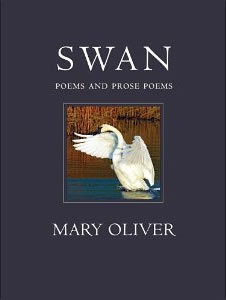Book Notes
 Mary Oliver, Swan; Poems and Prose Poems (Boston: Beacon Press, 2010), 63pp.
Mary Oliver, Swan; Poems and Prose Poems (Boston: Beacon Press, 2010), 63pp.
Back in 2007 the New York Times described Mary Oliver as "far and away, this country's [America's] best-selling poet." "Swan" is her twentieth volume of poetry, in addition to eight volumes of prose and then also two audio books. Among her numerous awards, her collection entitled "American Primitive" (1984) won the Pulitzer Prize for poetry, while "New and Selected Poems" (1992) won the National Book Award.
Oliver is famous for her solitary walks near her home in Provincetown, Massachusetts, and how those walks provide a rich fund of material for her to observe, ponder, and take great joy in the physical creation: "this gift of the world I adore so much and want to belong to." The forty-five poems in "Swan" follow this tried and true method. The "blessed earth" with its sun and moon, wind and water, fox and field provoke wonder and awe: "How rich it is to love the world!" To be blind in this dazzling theater is, in her mind, nothing less than "calamitous." In fact, she admits, "Okay, I confess to wanting to make a literature of praise."
Oliver isn't blind to what she calls "the hard places" of nature. Yes, nature is pretty, but she also names it as "perilous." The fox eats the rabbit, the kingfisher devours the fish. But why not compare that to "scalping mountains or fishing for oil." Eating rabbits is bloody enough, but "It's better than what's happening to the mountains and the ocean" thanks to humankind. If we learn the language of nature, it points beyond itself to human longing, yearning, purpose, and certainly "mystery irrefutable."
Oliver's empirical observations about nature lead unapologetically to spiritual intimations about humanity: In the poem from which the book gets its title, "Swan," she concludes: "And did you feel it, in your heart, how it pertained to everything? / And have you too finally figured out what beauty is for? / And have you changed your life?" Although one of her poems is entitled "I Worried," in "More Evidence" she writes, "I think I have not lived a single hour of my life by calculation. / Faith: this is the engine of my head, my breast bone, my toes."


